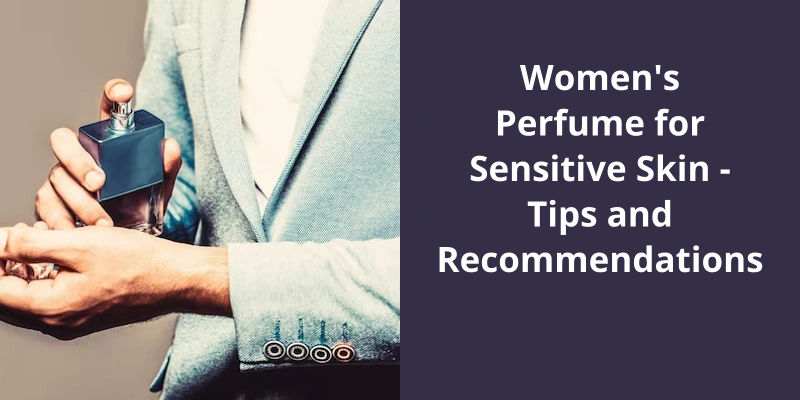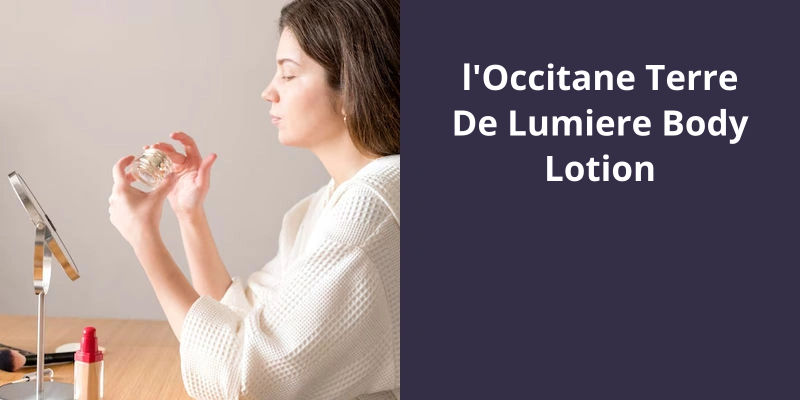Women’s perfume for sensitive skin should ideally be selected with utmost care, keeping in mind certain recommendations. Primarily, opt for fragrances that are free from harmful chemicals such as parabens, sulfates, and synthetic dyes, as these might cause irritation. Second, choosing organic and natural perfumes can be a good alternative, as they are usually made from plant-based ingredients that are less likely to cause a reaction. Third, it would also be beneficial to go for hypoallergenic perfumes that are specifically designed for sensitive skin. Mild, lighter scents are also usually well-tolerated on sensitive skin, as heavy scents can sometimes trigger allergies. Lastly, it’s always a good idea to perform a patch test before applying the perfume directly to your skin; this can help ascertain whether a particular product is suitable for you or not.

Is Fragrance-Free Better for Sensitive Skin?
For people with sensitive skin, even a small amount of fragrance in their skincare products could lead to irritation, dryness or redness. The fragrances used in skincare products are often synthetic and can be made up of hundreds of different chemicals. These chemicals have the potential to cause an adverse reaction on your skin. Fragrance-free products contain none of these chemicals, making them a much safer and gentler option for those who’re prone to skin sensitivity.
Fragrance-free skincare products are also a great option for those who suffer from conditions like eczema or psoriasis. These skin conditions are often triggered by certain chemicals and fragrances, which can lead to flare-ups and increased sensitivity.
Many fragrances can be irritating to your skin, even if you don’t notice any immediate visible signs.
So if youre worried that choosing a fragrance-free product means sacrificing quality or effectiveness, rest assured that this isnt the case.
So next time youre shopping for skincare products, consider choosing fragrance-free options and see the difference for yourself.
The Potential Harm of Synthetic Fragrances on the Environment
- Synthetic fragrances are widely used in cosmetics, cleaning products, and air fresheners.
- Many of these fragrances contain harmful chemicals that can negatively impact the environment.
- When these chemicals are released into the environment, they can contribute to air and water pollution.
- They can also harm wildlife and disrupt ecosystems.
- Some of the chemicals found in synthetic fragrances are known to cause health problems in humans, such as allergies and respiratory issues.
- Using products with natural or fragrance-free alternatives can help reduce the potential harm of synthetic fragrances on the environment.
Now that we know how to distribute fragrance without irritating sensitive skin, let’s explore some scented products that can help us smell good without any discomfort. From body lotions to signature laundry detergent, these five products promise to leave a lasting scent that won’t cause any irritation or unpleasant reactions.
How Do You Smell Good With Sensitive Skin?
For people with sensitive skin, finding fragrances that arent going to cause any adverse reactions can be tricky. Sensitive skin is prone to irritation, rashes, and breakouts, so it’s vital to keep potential harmful ingredients to a minimum. One great way to smell good without irritating your skin is to create a fine mist or aroma of fragrance around you. This not only gets rid of direct contact with the skin, but it will also distribute the scent evenly. You can easily do this by spraying perfume or essential oils around you and allowing it to settle on your clothing.
Body lotions are another great way to smell good while catering to sensitive skin. Look for lotions with ingredients like aloe vera, chamomile, and green tea, which are known to soothe irritated and sensitive skin. Another important tip is to avoid scented body lotions with synthetic fragrances as they can cause skin irritation. Stick to natural scents instead like cocoa butter, shea butter, and coconut oil for a long-lasting fragrance that will keep you smelling fresh all day.
When it comes to hair fragrance, it’s essential to choose a product thats specifically formulated for sensitive skin. This is because many hair fragrances are alcohol-based, which can dry out and irritate the scalp. To avoid this, look for hair fragrances that are water-based, free of drying alcohols and synthetic scents. These types of hair fragrances are gentle on sensitive skin and won’t cause any adverse reactions.
Another great product to test is signature laundry detergent. While laundry detergent doesn’t necessarily go unnoticed, it can play a big part in smelling good long after youve gotten dressed. When choosing a laundry detergent, it’s once again essential to avoid detergents with harsh chemicals and synthetic scents. Instead, opt for natural laundry detergents that use essential oils as a fragrance. Not only do natural laundry detergents smell great, but theyre also gentle on the skin, making them an excellent option for those with sensitive skin.
Finally, natural scents are a great way to smell good without causing any adverse reactions. Essential oils are a great option for those with sensitive skin as theyre derived from natural sources and are free of harsh chemicals. Not only do they’ve a pleasant smell, but they also offer a host of other benefits like improved mood, reduced stress and anxiety, and better sleep quality. Whether you choose to diffuse essential oils or wear them as a perfume, theyre a great option for sensitive skin types who want to smell good without any irritation.
It’s important to be mindful of the products we use on our delicate skin, especially when it comes to fragrances. For those with sensitive skin, certain perfumes can cause irritation and even allergic reactions. This is particularly true for those with pre-existing skin conditions like Atopic Dermatitis. Let’s take a closer look at the impact of perfume on sensitive skin and what you can do to protect yourself.
Is Perfume OK for Sensitive Skin?
When it comes to fragrance, it’s important to understand that not all products are created equal. Some can contain ingredients that are much more likely to cause irritation than others, especially if you’ve sensitive skin. The key is to look for products that are specifically designed for sensitive skin, and to avoid anything that contains known irritants like alcohol and artificial colors.
If you do have sensitive skin and are considering trying a new perfume, it’s a good idea to do a patch test first. Simply apply a small amount of the perfume to a small area of skin, such as the inside of your wrist, and wait 24 hours to see if any redness, itching, or other signs of irritation develop. If you do experience any negative reactions, it’s generally best to avoid that particular fragrance and look for something else.
Another thing to keep in mind is that even if a perfume is labeled as “natural” or “organic,” it can still contain ingredients that could irritate sensitive skin. For example, essential oils like lavender and citrus can be very potent and may cause irritation in some people. It’s always a good idea to read the ingredient list carefully before purchasing a new perfume, and to consult with a dermatologist if you’ve any concerns.
If you’ve been on the lookout for a perfume that won’t irritate your sensitive skin, you may have encountered the term “hypoallergenic.” This term refers to products that have been formulated to minimize the risk of an allergic reaction. And when it comes to hypoallergenic perfumes, Dossier has got you covered. Their line of fragrances is entirely free of harsh chemicals and artificial fragrances, making them a safe and soothing choice for those with allergy-prone skin. But what exactly makes these perfumes hypoallergenic, and how do they compare to other fragrances on the market? Let’s take a closer look.
Are There Any Perfumes That Are Hypoallergenic?
For those with allergies or sensitive skin, finding a suitable perfume can be a challenge. Many perfumes contain harsh chemicals and artificial fragrances which can irritate the skin and cause allergic reactions. However, there are hypoallergenic perfumes available that are free from these irritants.
Dossier is one brand that offers a range of hypoallergenic perfumes. Their perfumes are formulated without the use of parabens, phthalates and other harsh chemicals. Instead, they use natural ingredients and essential oils to create their fragrances. This makes them gentle on the skin and less likely to cause irritation or allergy symptoms.
One of the advantages of using hypoallergenic perfumes is that they can be worn without any worries about triggering an allergic reaction. This means that you can enjoy the benefits of wearing a beautiful fragrance without suffering any negative side effects.
This is because they don’t contain the same high level of synthetic fragrances. This makes them a good choice for people who prefer a more subtle scent.
Not only will it be gentler on your skin, but it will also allow you to wear a fragrance without any worries about causing an allergic reaction. With brands like Dossier offering hypoallergenic options, there’s no need to compromise on quality or scent.
How to Identify if You Have a Perfume Allergy or Sensitivity
If wearing perfume causes you to experience symptoms such as headache, sneezing, skin irritation, or asthma-like symptoms, you may have a perfume allergy or sensitivity. You can confirm this with an allergy test or by attempting to avoid perfumes and observing any improvements in your symptoms.
Source: Hypo Allergenic Perfume – Dossier
Taking care of your skin before applying perfume is crucial to make the fragrance last longer and smell divine. It’s important to ensure that your skin is well-hydrated and moisturized before applying any perfume, as the fragrance can blend in better with soft and supple skin. In order to achieve this, you can apply an unscented body lotion or Vaseline to your skin before spritzing on some perfume. This won’t only help lock down the scent but will also keep your skin nourished and healthy.
How Do You Prepare Your Skin for Perfume?
This creates a barrier between your skin and the perfume, preventing the scent from being absorbed too quickly or evaporating too fast.
Next, avoid applying perfume directly to your clothes as it can stain them. Instead, spritz it on pulse points such as behind your ears, on your wrists, and on your neck. These areas are great for perfume application as they’re warm and have good blood flow, which helps release the fragrance in the air around you.
It’s also important to consider the time of day when choosing a perfume. Heavier and richer scents are better for the evening or cooler months, while lighter and fresher fragrances are better for daytime and warmer seasons.
Finally, be mindful of how much perfume you apply. Overdoing it can be overwhelming and off-putting to those around you. A couple of spritzes are usually sufficient, and if you need to freshen up throughout the day, carry a travel-sized atomizer in your bag.
In summary, preparing your skin for perfume involves ensuring it’s hydrated and applying a barrier such as unscented lotion or Vaseline. Apply perfume to pulse points, consider the time of day and occasion when choosing a scent, and be mindful of how much perfume you apply. Following these steps will ensure your perfume lasts longer, smells great, and isn’t overpowering.
How to Incorporate Fragrance Into Your Home Through Candles, Diffusers, and Other Scented Products.
- Use scented candles in different areas of your home
- Invest in a high-quality electric or reed diffuser
- Spritz linen sprays on your pillows and sheets
- Incorporate scented sachets in your closet and drawers
- Burn essential oils with an oil burner
If you’re one of the many people who suffer from perfume allergies, don’t despair. There are a variety of treatments available to help alleviate your symptoms so that you can live your life without worrying about sneezing, wheezing, or rashes. From over-the-counter creams to prescription medications, there are plenty of options to explore. In this article, we’ll take a closer look at how to manage your perfume allergy and live comfortably in a scent-filled world.
What Can I Use if I’m Allergic to Perfume?
Perfume allergy is a common condition that affects millions of people worldwide. It occurs when individuals experience a hypersensitive reaction to the scent of perfumes or other fragrances. Symptoms may include itching, redness, and bumps on the skin, as well as other respiratory issues like wheezing, coughing, and shortness of breath. Individuals who experience these symptoms should seek medical attention immediately to identify the cause of their allergy.
For some people, cortisone creams may provide relief from the symptoms of perfume allergy. These creams contain steroids that can reduce inflammation and irritation on the skin, helping to alleviate itching, redness, and other skin conditions. Over-the-counter versions of these creams are available at most drug stores, but stronger prescription versions may be necessary.
These medications work by reducing inflammation in the lungs and airways, which can help alleviate respiratory symptoms like wheezing and shortness of breath. In severe cases, doctors may recommend that patients use nebulizers or other breathing devices to deliver inhaled corticosteroids directly to the lungs.
Individuals with perfume allergy should also take steps to avoid exposure to fragrances that cause their symptoms. This may include avoiding perfumes, colognes, and other fragrances, as well as using fragrance-free soaps, shampoos, and other personal care products. Some people may also benefit from wearing clothing made from natural fibers like cotton, which can help reduce skin irritation and other symptoms.
By working with their doctors and using medications and other treatments as prescribed, patients can reduce the severity of their symptoms and enjoy improved health and well-being. If you suspect that you may be allergic to perfume or other fragrances, contact your doctor for an evaluation and recommendations for treatment.
Common Ingredients in Perfumes That People May Be Allergic To
- Fragrance oils
- Essential oils
- Cinnamic alcohol
- Eugenol
- Geraniol
- Linalool
- Citral
- Coumarin
- Limonene
- Benzyl alcohol
- Alpha-isomethyl ionone
- Benzyl salicylate
- Farnesol
- Benzyl benzoate
- Citronellol
- Hexyl cinnamic aldehyde
- Isoeugenol
Conclusion
In conclusion, women's perfume for sensitive skin isn’t only a highly sought-after product in today's market, but it’s also an essential tool for those seeking both fragrance and protection. With countless options available, it can be overwhelming to find the right one. However, by focusing on ingredients that are gentle, hypoallergenic, and free from harmful chemicals, women can enjoy a delightful scent that’s safe for their skin. In addition, this line of fragrances promotes healthier skin by eliminating allergic reactions, rashes, and other skin conditions.





